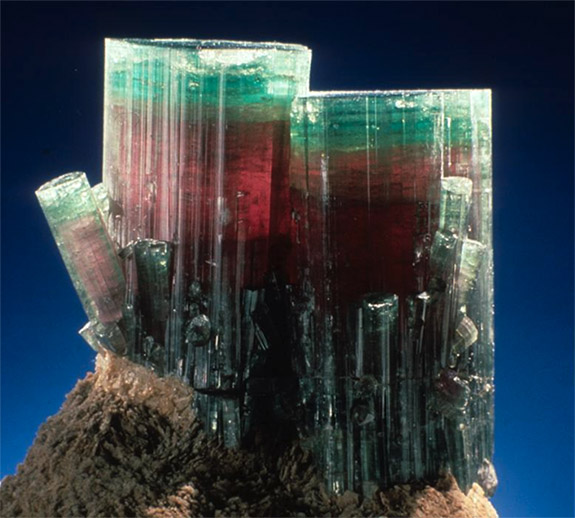Hailing from San Diego County, CA, and standing 11 inches tall is “The Steamboat” tourmaline — a truly amazing example of October's birthstone.
The specimen’s two parallel crystals — which resemble steamboat stacks — display a range of vibrant colors that start at vivid reddish-pink at the bottom and transition to a bright bluish-green at the top. The tourmaline crystals rise out of a base of Cleavelandite, which is perched atop a large quartz crystal "hull."
Frank Barlow Schuyler is credited with discovering the fascinating formation at the Tourmaline King Mine in 1907. Three years earlier, Schuyler and a partner, D.G. Harrington, literally stumbled upon an enormous pocket of tourmaline crystals while searching for pegmatite in the Pala Chief Mountains.
Schuyler soon discovered that the tourmaline-rich pocket extended 30 feet in length and 10 feet wide, a single zone that would yield about eight tons of beautiful pink tourmaline. Schuyler would eventually sell most of the bounty to the Imperial Chinese government for $187.50 per pound. The $3 million worth of tourmaline that was pulled from the mine more than a century ago would be worth more than $86 million in today's dollars.
By 1915, Schuyler was still riding the wave of his tourmaline-based good fortune. At the Panama Pacific International Exhibition in San Francisco, the owner of the Tourmaline King Mine marketed his gems with the slogan, “Wear a tourmaline for luck.”
The “Steamboat” tourmaline was later purchased by master engineer Washington A. Roebling, who included it in his collection of 16,000 mineral specimens. Roebling was most famous for supervising the construction of the Brooklyn Bridge.
Roebling’s son, John A. Roebling II, donated “The Steamboat” to the Smithsonian Institution, where it is has been on permanent display at the Janet Annenberg Hooker Hall of Geology, Gems, and Minerals, which is part of the National Museum of Natural History in Washington, DC.
According to the Smithsonian, the tourmaline family consists of more than 30 distinct minerals, but only one — elbaite — accounts for nearly all of the tourmaline gemstones. Varieties of gem-quality elbaite include rubellite (red-pink), indicolite (blue), Paraiba (neon greenish-blue) and the multicolored watermelon (pink surrounded by green).
Tourmaline shares the spotlight with opal as the official birthstones for the month of October.
Credits: Photos by Dane A. Penland / Smithsonian.


